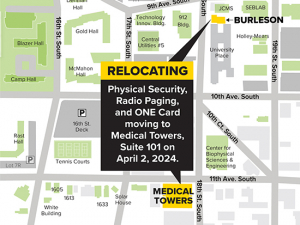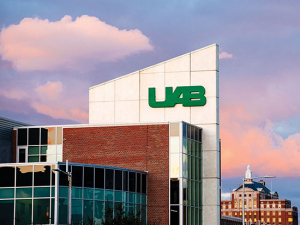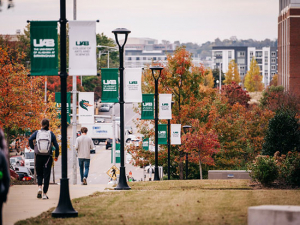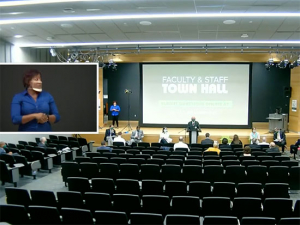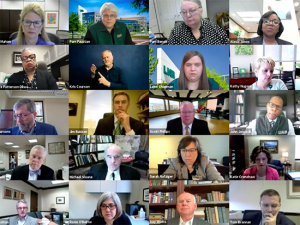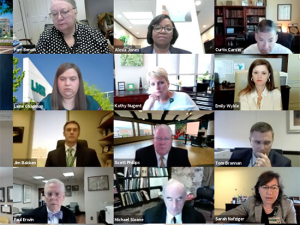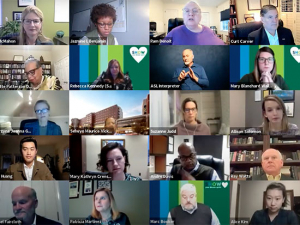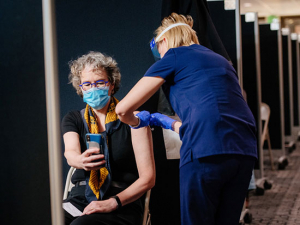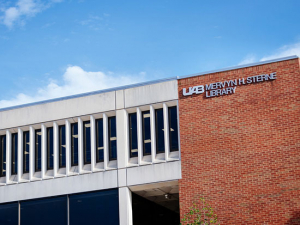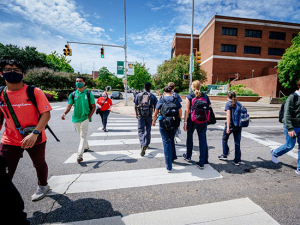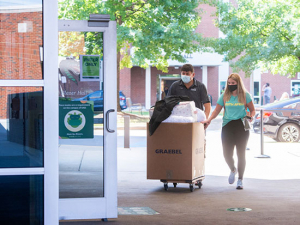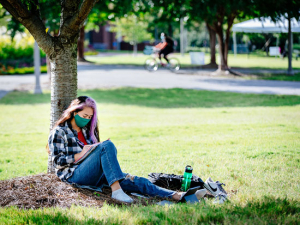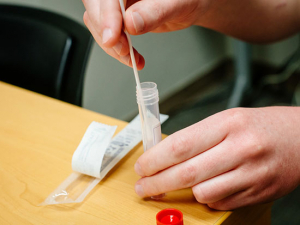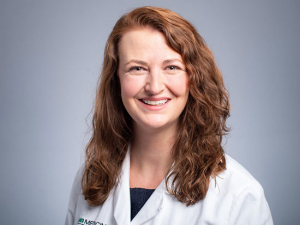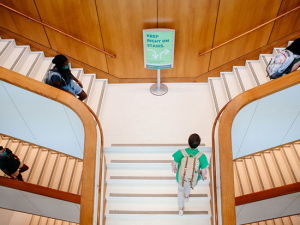Editor’s Note: The information published in this story is accurate at the time of publication. Always refer to uab.edu/uabunited for UAB’s current guidelines and recommendations relating to COVID-19.
Following the faculty and staff town hall Aug. 17, senior leaders have responded to questions submitted online that could not be addressed live due to time constraints. (Watch the full town hall here and read a related communication from President Watts here.
Scroll down to read the complete summary or use the links below to jump to specific topics
Campus safety measures and return to work
Merit raises and other financial questions
Campus safety measures and return to work
Q: Frustrations clearly are high. What are UAB leaders going to do to address this?
It is understandable that frustrations are high. We all thought we had turned a corner after an extremely challenging and exhausting year, but we have taken a step back due to the Delta variant and a lack of vaccinations. First, we will do our best to maintain a dialogue with our employees, UAB's most valuable asset. Honoring our institutional values of transparency and collaboration, we will continue to communicate updates, information and resources, as well as listen to and answer questions and concerns during this uncertain, evolving time. Employees are reminded that the UAB Employee Assistance & Counseling Center offers free, confidential support services for UAB employees and members of their immediate household, and UAB's B Well app allows for easy access to available health and wellness resources.
Q: Shouldn't football games and other sporting events be stopped until COVID is under control?
UAB Athletics is committed to following NCAA and Conference USA, as well as UAB, COVID-19 health and safety guidelines for athletics teams and competitions. The first UAB Football game at Protective Stadium is in October, and it is not clear at this time what the community health status will be at that time. As we have since the beginning of the pandemic, we will continue to monitor data to drive decision-making.
Q: Why are we not in the limited business model now since the Delta variant is on a surge?
UAB's limited business model was applied in the early days of the COVID-19 pandemic when there was little information about the virus and its impact. In the current environment, based on the guidance of medical and public health experts, UAB is able to implement multiple layers of protection to return to more routine campus operations. These include vaccination, masking, and testing and care for students and employees with symptoms and exposure, among others.
Q: Since our only defense is masking, will students be given KN95s or N95s?
Based on guidance from medical and public health experts, cloth face masks, worn correctly, are effective in reducing risk of COVID-19 transmission. Face masks must cover mouth and nose and consist of two layers of fabric with no valves.
Q: Has UAB seen an increase in turnover/decrease in retention since return-to-work was announced?
Recognizing there are multiple factors that contribute to turnover, at this point, we have not seen any significant changes but continue to monitor for trends in order to identify and address concerns. Maintaining the best talent to support UAB’s mission is a top priority.
Q: Will UAB suspend work-related travel or other events?
UAB leadership continues to monitor community health data to make decisions about travel and events to protect the health and safety of employees, students and visitors. UAB-related international travel is not allowed under current health and safety guidelines. Domestic travel is allowed under current health and safety guidelines. However, expenditures, including conference registration fees, must be pre-approved through the Travel Pre-Approval Form. UAB's guidelines for protecting health and safety of attendees at events and gatherings that are university-sponsored on- or off-campus, indoors or outdoors, were updated Aug. 12, 2021. Events must be registered through the Event Registration Form or Engage, as appropriate. Event staff and attendees are required to wear masks indoors on campus regardless of vaccination status; outdoor events on campus usually do not require participants to wear face masks regardless of their vaccine status. However, wearing a face mask at an outdoor event is strongly encouraged to help mitigate the spread of COVID-19.
Q: What are the exemptions for the mask requirement? I have asthma and the mask makes it worse.
Medical and disability exemptions to the face mask requirement will be provided with proper documentation. Requests for accommodation may be made to the AWARE program in Human Resources or the Office of Disability Support Services in Student Affairs.
Q: Is UAB going to put back the social distancing markers/stickers to help remind people not to crowd together?
The social distancing signage was taken down to reduce confusion as required distances changed. Signage around campus continues to emphasize the indoor face mask requirement. Studies consistently demonstrate the effectiveness of masks. In fact, a study of North Carolina schools reported that proper masking was the most effective mitigation strategy to prevent secondary transmission. The study also showed that distance was not a factor in the spread of COVID-19 when students/staff/teachers were masked; masking was adequate to prevent within-school COVID-19 transmission, with no difference between schools requiring greater than three feet of distance between students compared to those requiring less than three feet.
Q: What is the status of the GuideSafe App? Does UAB foresee returning to using it?
UAB Healthcheck and its digital "passport" are still used on a daily basis by employees and students entering clinical facilities. Employees and students in university facilities are no longer required to complete a daily health screening via Healthcheck. However, if they experience any COVID-19 symptoms or potential exposures, they must complete the Employee Exposure & Symptom Form or Student COVID Screening Survey, as appropriate, to receive instructions and care from UAB Employee Health or Student Health Services. Additionally, all UAB employees, students, visitors and community members are encouraged to download the GuideSafe Exposure Notification App. This app protects the user's privacy while anonymously alerting them if they have been exposed to someone who tested positive for COVID-19.
Q: Can/will UAB provide childcare for mildly sick children? Many daycares will not accept ANY children with ANY symptoms, COVID or not, so it's very hard to keep working full time.
Employees are encouraged to speak to their supervisors about challenges they encounter due to childcare or their need for sick time to care for someone residing in the same household. Information about childcare resources in the local area can be found on the Human Resources site here. In particular, Childcare Resources' Resource and Referral Program is a free service that guides families through the process of locating quality childcare.
Q: I am a regional recruiter who works remotely, visiting students/high schools. I am concerned about safety for those of us working in these settings.
Masking and vaccines are our best tools and highly effective. First, to protect yourself and others, please get vaccinated, wear a mask and practice good hand hygiene. Data continue to consistently show that masks work, and that people who are vaccinated are overwhelmingly protected against serious complications and death from COVID.
Q: For the vaccination numbers being published by UAB, what are the parameters (only fully vaccinated, at least one dose, etc.)?
Vaccination data currently published on the UA System COVID-19 Dashboard reflects the percentage of full-time and part-time regular employees of the university, including the School of Medicine. It does not include employees within UAB Medicine. Currently, the vaccination rate among university employees stands at 72%. Recently, the university announced a new employee vaccination incentive program to move this number closer to 100%.
Q: How is the UA System and UAB working to rebuild trust among faculty and staff that was damaged by April's announcement of an about-face in campus re-entry strategy?
The UA System and UAB, including the UA System Health and Safety task force that includes robust representation from public health and infectious disease experts, will continue to make data-driven decisions to best fulfill our mission while maintaining a safe environment. Regarding current and future opportunities for remote and hybrid work, we will provide updates on the progress of the pilot program and decisions made and policies enacted to guide future opportunities.
Q: Being in-person in the office and in meetings contributes to the spread; we have all had issues with non-masking colleagues and known exposures. Why in the worst of this are we continuing to be face-to-face, placing danger to ourselves and our community?
This is a balance considering the availability of effective safety measures like vaccines and masks and the value of in-person work (in many positions) to those we serve. For example, data tell us that in-person learning and face-to-face engagement improve student performance, retention and graduation rates, so we intend to offer as many in-person opportunities as we can while emphasizing safety measures and personal responsibility. Masking — on and off campus — and vaccines are the tools we have to help us ensure those experiences are available. First, to protect yourself and others, please get vaccinated and wear a mask. Data continue to consistently show that masks work, and that people who are vaccinated are overwhelmingly protected against serious complications and death from COVID. Anyone who is immunocompromised and at higher risk of complications should inquire about UAB's AWARE program. Concerns about anyone not following safety requirements like masking can be reported anonymously to our ethics hotline so the issue can be addressed.
Q: What can UAB do to use data to convince our local governments to reinstate a mask mandate?
UAB public health and infectious disease experts continue to make themselves available to consult with elected officials as well as deliver key messages through internal and external communication channels, including social media and public presentations, as well as regular appearances in local, state, national and international media.
Q: If the solution here is vaccines, what is the alternative if the large proportion of the population that is not vaccinated does not change their minds? Then what?
As of Aug. 18, 2021, the vast majority of UAB faculty and staff — about 70% — have already been vaccinated against COVID-19, and we hope that the one-time $400 incentive for all employees and mandated vaccines for Health System employees will move us closer to 100%. If you need a vaccine, you can get one by appointment or at a walk-in clinic on campus. By mid-August, we estimate that more than 60% of students have received at least one COVID-19 vaccine dose. Some 54% of students (excluding fully online students) are confirmed with Student Health to have received at least one dose, with 50% fully vaccinated. We identified an additional 6% of students who volunteered via a survey that they had been vaccinated. Incentives also are being offered to improve that margin, including Blazer Bucks, textbook vouchers and swag. We anticipate these will continue to increase. In the meantime, please continue to mask.
Q: Most of us who worked from home in 2020/2021 kept all original duties, and some of us even took on more work. What is planned to recognize those employees? Why are we requiring them to return to work during the biggest surge of the pandemic so far?
Based on several factors considered in the context of UAB’s being a large and complex organization, the desire to create an equitable return to campus based on the previous guidelines, and the need to provide the best possible experience to students and other key constituents, we updated our return guidance to create a more consistent and clear return policy. As would be expected in an institution as large and complex as ours, experiences with remote and hybrid work have been uneven. We realize some employees have a personal preference to continue remote work indefinitely, but we are not able to make any announcements or decisions regarding long-term possibilities at this time. The factors and implications that have to be considered, decisions that have to be made and the policies and systems that would have to be created or changed to accommodate long-term adjustments to staffing are expansive. Our Remote Work Task Force gathered data and had important discussions to inform the remote/hybrid pilot program that launches Sept. 1. The pilot will inform long-term decisions about remote/hybrid opportunities.
Q: Next week there will be 200-plus students in the room you are in now. You limited today to 100 registrants, and it doesn't look from the video to be even close to that. How is it that you can't be in a full room today when students and faculty will be there in six days?
Data tell us that in-person learning and face-to-face engagement improve student performance, retention and graduation rates, so we intend to offer as many in-person opportunities as we can while emphasizing safety measures and personal responsibility, made possible by a mask requirement and widely available free, safe and effective vaccines. While classroom distancing that requires remote and hybrid learning can be disruptive to learning and student success across a semester or school year, it was determined that being in-person was not important to the success of this one-time event. Our virtual town halls throughout the pandemic were well-attended, and it was not possible to host an all-in-person meeting with the thousands of people who attend town halls, so a virtual option was necessary.
Q: Why is there no social distancing in the classrooms this fall?
Data tell us that in-person learning and face-to-face engagement improve student performance, retention and graduation rates, so we intend to offer as many in-person opportunities as we can while emphasizing safety measures and personal responsibility. Masking — on and off campus — and vaccines are the tools you have to help us ensure those experiences are available. We are better positioned than we were a year ago: A free, safe and effective COVID-19 vaccine that protects against serious complications is available. Regardless of your age, health status or prior exposure to the virus, the benefit of this vaccine far outweighs the short-term, minor side effects of the vaccination. The vast majority of UAB faculty and staff — about 70% — have been vaccinated against COVID-19, and we hope that the one-time $400 incentive and mandated vaccines for Health System workers will move us closer to 100%. If you need a vaccine, you can get one by appointment or at a walk-in clinic on campus. As of Aug. 19, 2021, we estimate that more than 60% of students have received at least one COVID-19 vaccine dose. Some 54% of students (excluding fully online students) are confirmed with Student Health to have received at least one dose, with roughly 50% fully vaccinated. We identified an additional 6% of students who volunteered via a survey that they had been vaccinated. Incentives also are being offered to improve that margin, including Blazer Bucks, textbook vouchers and swag. Second, studies consistently demonstrate the effectiveness of masks. In fact, a study of North Carolina schools reported that proper masking was the most effective mitigation strategy to prevent secondary transmission. The study also showed that distance was not a factor in the spread of COVID-19 when students/staff/teachers are masked; masking was adequate to prevent within-school COVID-19 transmission, with no difference between schools requiring greater than three feet of distance between students compared to those requiring less than three feet. This is the reason UAB requires face masks indoors on campus — regardless of vaccine status. Read CDC guidance here.
Q: Now that all have returned to campus, where are we supposed to go and eat lunch and still keep ourselves and others safe? Most surrounding eateries are either still closed, no longer require social distancing or do not offer curbside pickup for to-go orders.
Indoor options that offer space include the Hill Center, Dining Commons and others. There are also outdoor options — you can discover 11 outdoor oases hiding in plain sight on the Reporter website.
Q: What about adopting Birmingham-Southern's example of allowing unvaccinated students as long as they agree to be tested on a regular basis?
We continue to monitor vaccine status of our campus community and encourage and incentivize vaccines, and we will continue to explore other options to encourage vaccines and increase safety.
Q: Who is on the COVID task force for UAB? Is there any transparency in how these decisions are being made?
The UA System Health and Safety Task Force membership is posted here. The UAB Incident Command Committee is posted here.
Q: Will fabric face masks with a clear panel be approved for use on campus
Fabric face masks with a clear panel are approved for use on campus. Face masks must cover mouth and nose and consist of two layers of fabric with no valves. Face shields worn alone are not acceptable, although they may be used in addition to face masks.
[back to topic list]
Vaccines and COVID treatments
Q: Given that the Supreme Court declined a request to block Indiana University's vaccine mandate, if and when does the university plan to require vaccines for students, faculty and staff? We require immunizations for measles, mumps and rubella. Why has UAB not become a leader on this?
We continue to monitor vaccine status of our campus community and encourage and incentivize vaccines, and we will continue to explore options to encourage vaccinations within the law. Note: Since the town hall, UAB Health System announced a vaccine requirement for Health System employees, and a $400 incentive is being offered to university and Health System employees. Student incentives are also available.
Q: When can every age group get vaccines?
Currently, the FDA has authorized the Pfizer vaccine for ages 12 and older. Full approval for Pfizer (for 16 and older) was announced Aug. 23 and approval for Moderna (18 and older) is anticipated within the next few weeks. In addition, authorization of the Pfizer vaccine for 5- through 11-year-olds may be made in the fall of 2021.
Q: If we are vaccinated why do we need to wear masks?
Masks are critical for helping stop the spread of COVID when we are in times of extremely high cases, as we are right now. The vaccine keeps you from getting a severe infection, but it does not stop you from spreading COVID to others. Vaccinated people can catch and spread COVID, particularly with the highly contagious Delta variant now circulating. So for now, because of the very high prevalence of the Delta variant in our community and the emergence of breakthrough cases in vaccinated individuals, we are requiring everyone to mask while indoors. While breakthrough cases happen, vaccinated individuals are far more protected from serious complications and death than unvaccinated people. Read CDC guidance here.
Q: What are you doing to protect employees who are immunocompromised and at greater risk even when vaccinated? Will you be allowing temporary remote work again? How safe is it for someone who is immunocompromised to be on campus masked?
We are encouraging and incentivizing every employee to be vaccinated, which is our best strategy to prevent COVID infection, and are offering additional third doses of Pfizer vaccine to our immunocompromised employees as well. Because of the high prevalence of COVID in our community right now, we are also requiring mask usage while indoors. We have taken other safety measures, such as hand hygiene stations, enhanced sanitation and event protocols, among others.
Q: When will the Flu vaccine be available this year?
Influenza vaccines will be available for all UAB employees starting Oct. 1.
Q: How long is the booster supposed to last?
As of today, an additional dose of vaccine is recommended for individuals with immunocompromising conditions. At this point, it is too soon to say how long additional doses of COVID vaccine will provide adequate protection.
Q: What about testing employees who work in COVID units routinely?
At this time, we are not offering routine COVID testing for asymptomatic employees; however, this could change in the future. Watch official channels of communication for updates.
Q: Can you give us a sense of the patient characteristics for vaccinated persons admitted to the hospital, percentage of those in ICU vs non-ICU, type of vaccine received?
The vast majority of patients who require hospital admission are unvaccinated. For those who are vaccinated, the majority are elderly and/or have immune-suppressing or other serious underlying medical conditions.
Q: Do you have any words of reassurance for pregnant women who need hospital rooms this fall? Should they get vaccinated if they have not done so already?
It is important for pregnant women to keep themselves and their unborn baby safe by receiving a COVID-19 vaccine. The American College of Obstetricians and Gynecologists and the Society for Maternal Fetal Medicine and the Centers for Disease Control and Prevention recommend that all pregnant women be vaccinated against COVID-19. Pregnant women have a higher risk of severe illness from COVID-19 than nonpregnant women. Additionally, pregnant women with COVID-19 are at an increased risk of preterm birth. The vaccines are very effective at preventing COVID-19 infection, severe illness and death. A growing amount of data confirms that COVID-19 vaccines are safe during pregnancy. Scientists have compared the pregnancies of women who have received COVID-19 vaccines and women who have not. The reports show that these women who were vaccinated did not have an increase in miscarriage, stillbirth, premature birth, small babies, birth defects or newborn death compared to women who were unvaccinated. Overall, data collected by three safety monitoring systems did not find any safety concerns for pregnant women who were vaccinated or for their babies.
Q: Can you speak to other therapeutics that may be out there for the treatment of COVID-19 that can be initiated at the onset of infection for those who may be at risk of anaphylaxis from the vaccine?
Monoclonal antibody therapy is available in limited supply for patients who are at the most serious risk of poor outcomes from COVID 19 infection. Studies to identify new treatments are currently underway. See answers to five questions about monoclonal antibodies in this story.
Q: Can I wear three masks with no side effects?
The CDC recommends wearing a mask that is made of at least two layers of washable, breathable fabric. You can see their guidance regarding how to select a mask here.
Q: CDC has announced that a third shot is encouraged at eight months. Is there any advice for persons who got the J&J shot?
The announcement did not speak specifically to people who have received the Johnson & Johnson vaccine shot, but most experts agree that considering a booster with one of the mRNA vaccines (Pfizer or Moderna) in the same timeframe (eight months or longer after the first vaccine) would be reasonable.
Q: I was in the first round of vaccinations, and I received the yellow card with Pfizer/UAB Medicine on the back, not the CDC vaccine card. How can I get an updated card? Or would I need one?
If you received a yellow card and would prefer a white CDC vaccine card or if you have lost your vaccine card, you can request a replacement by emailing employeehealth@uabmc.edu. We recommend that you take a photo of your vaccine card as well so that you can have a digital record.
Q: I tested positive for COVID July 19 and still tested positive Aug. 13. I assumed a COVID test would be negative within a shorter period of time after the initial positive test. Is this reasonable?
People can remain positive on average for about 9-10 days after initial infection. We have seen some people, especially those with immune-system problems, remain positive for weeks after their initial infection, but that is relatively unusual.
Q: Can you provide any information on other known variants?
The most common circulating variant right now is the Delta variant. Scientists are continuing to monitor for emergence of new variants.
Q: Can UAB post the inserts from the vaccines? My friends and neighbors are asking what is in the vaccines.
This information is on the FDA site here.
Q: Is ivermectin administered to COVID patients at UAB? if not when will that begin?
No, at this time there is no recommendation for treatment of COVID patients with ivermectin.
Q: How do we discuss vaccines with people who believe the vaccines are killing people?
Vaccines for COVID-19 have been administered to millions of people, and the data shows that very small numbers of people have suffered any adverse reaction. For more information, visit this FDA page and this CDC page. This is a very helpful article from UAB that has convinced a lot of people to get vaccinated.
Q: What about Sweden? No surge, no vaccine.
No vaccine is 100% effective at preventing infection. Sometimes, as is the case with COVID-19, the vaccine keeps a person from developing severe symptoms that could lead to hospitalization and/or death. This is a win for this vaccine. If COVID-19 were more like the common cold in terms of severity, we would not have to take such extreme measures to protect the health care system. Sweden has not yet had a Delta variant outbreak, but they are bracing for a surge as they have recently seen an uptick in Delta variant infections.
Q: Recently, the hospitalization report by the Jerusalem Post revealed that 58% of patients were fully vaccinated, while only 39% were unvaccinated. They have raised serious questions concerning some major assumptions around COVID-19 vaccination. Could you please explain that? Huge thanks.
The vaccine isn't perfect. There are some people who are vaccinated who will wind up in the hospital. In a country like Israel or Iceland where more than 85% of the population is vaccinated, the proportion of folks in the hospital who are vaccinated will be higher. But the overall number of hospitalizations will be down, which makes it easier for the doctors and nurses to treat those few severe cases. Israel currently has less than 200 hospitalizations and has a population of 9 million. Alabama has a population of 5 million and has more than 2,500 hospitalizations.
[back to topic list]
Working from home
[Read more about the alternative work pilot program in this Reporter story published Aug. 26: Answers to questions about alternative work pilot program]
Q: Will UAB honor remote/hybrid assignments made prior to the pandemic (March 2020)?
UAB will allow documented pre-March 2020 telecommuting arrangements to continue until further notice. New telecommuting arrangements will be provided from HR for all employees documented as "remote" prior to March 2020.
Q: Will the previous experience of 14 months of successful remote working be factored into this process? If so, how?
UAB's experience with hybrid/remote work during the pandemic has helped inform the feasibility of long-term hybrid/remote work. Some of the goals we hope to accomplish during the current Alternate Work Options Pilot include developing structure, guidelines and productivity measures to manage the program effectively.
Q: Why isn't the School of Medicine included in the pilot?
UAB's original plan was to include staff in schools and colleges in the initial phase of the pilot, but the resurgence of COVID through the Delta variant has made managing a Sept. 1 start date unrealistic for the schools and colleges, which are planning and adapting to start the fall semester. Schools and colleges will have the opportunity to join the pilot at a later date.
Q: What happens if an employee wants to participate in the remote work program but the department does not want to participate?
Eligibility to participate in the pilot program is not based on an individual's desire to work remote/hybrid. Eligibility is based on two factors:
- First, your unit must be a part of the pilot group – which, at this time, is limited to the central administrative units; AND
- Second, the job must be eligible to be considered for remote/hybrid work and included in the unit’s approved operational plan.
Q: Why are only central administration employees approved for the pilot remote work? Thinking about the UAB values of Collaboration and Equity, it seems odd that the hybrid work pilot applies ONLY to central admin.
UAB's original plan was to include staff in schools and colleges in the initial phase of the pilot; but the resurgence of COVID through the Delta variant has made managing a Sept. 1 start date unrealistic for the schools and colleges, which are planning and adapting to start the fall semester. Schools and colleges will have the opportunity to join the pilot at a later date.
What is the site that lists the jobs that are eligible for remote work?
Employees of central administrative units may access the UAB Employee Workforce App online to determine whether their job title/role can be considered for an alternate work schedule in Phase I of the pilot. If your job is eligible for consideration, you will see “Remote/Hybrid-Possible: Yes, if supported by the operational plan.”
Q: Can we please have clarity on when people are allowed to work on campus? We've had two employees in the exact same situation told two different things on the same day.
Additional information is required to fully respond to this question. Please contact your HR Consultant for assistance.
Q: How can we address people who frequently inform their supervisors that they've been in contact with someone with COVID? Some people use it as a reason to work from home and not come in.
Supervisors should contact their HR Consultant for assistance if they believe an employee is misrepresenting their COVID-19 exposure status.
Q: How will employees be identified to participate in the remote/hybrid work pilot program? Is it up to manager's discretion, self-identification or some other process?
A proposed hybrid or remote work schedule should benefit the institution and must be made based on the job/business need, not an individual’s personal need or desire. If a group or individual’s job title/role can be considered for a remote/hybrid work schedule, an administrative unit has the discretion — based on local needs including the ability to manage and monitor productivity among groups or individuals — to include or not include those positions/individuals in proposed operational plans.
Q: For those of us in shared workspaces, can we make arrangements to split time on campus to minimize risk?
Please work with your supervisor to assess the specifics of your work environment to obtain the best response to your question. You may also contact your HR Consultant for assistance.
Q: Is there an appeal process for supervisor denial of the remote work pilot?
Eligibility to participate in the pilot program is not based on an individual's desire to work remote/hybrid. It is important to understand that approval to participate in the pilot is not determined until after operational plans are submitted and approved. Eligibility is based on two factors:
- First, your unit must be a part of the pilot group – which, at this time, is limited to the central administrative units; AND
- Second, the job must be eligible to be considered for remote/hybrid work and included in the unit’s approved operational plan.
Q: I was approved for the remote work pilot, but my supervisor said I am no longer eligible.
Eligibility to participate in the pilot program is not based on an individual's desire to work remote/hybrid. It is important to understand that approval to participate in the pilot is not determined until after operational plans are submitted and approved. Eligibility is based on two factors:
- First, your unit must be a part of the pilot group – which, at this time, is limited to the central administrative units; AND
- Second, the job must be eligible to be considered for remote/hybrid work and included in the unit’s approved operational plan.
Q: The pilot program only allows for a maximum of 5% of a workgroup to be fully remote and 25% as hybrid. If 100% of a workgroup can operate fully remote, how is it in the spirit of fairness and equity to provide only 30% of the workgroup with this benefit?
A proposed hybrid or remote work schedule must be made based on the job/business need. For this reason, not all eligible areas will select individuals to participate in the pilot. Supervisors are encouraged to use discretion to determine what staffing structure in their unit is best for the institution and aligns with UAB's shared values. Finding the proper balance to support all aspects of the UAB mission is essential. Eligibility will be reassessed after the pilot.
Q: Why is there going to be training for remote work, when we've been doing remote work for the last 17 months?
It has been determined that training is required to ensure expectations are established and relevant information is shared to help support a successful alternative work experience.
Q: Is there any reason why the remote work pilot group status in the workforce app would be incorrect? My status says I am eligible; my department has said that is incorrect and does not apply to any department in the School of Medicine.
The Workforce App is populated with information for all positions, not just the positions eligible to be considered for participation in the pilot. Eligibility is based on two factors:
- First, your unit must be a part of the pilot group – which, at this time, is limited to the central administrative units; AND
- Second, the job must be eligible to be considered for remote/hybrid work and included in the unit’s approved operational plan.
[back to topic list]
Academics
Q: What metrics are being used to shift to virtual learning?
We are carefully monitoring data in the community and across campus. A number of factors are considered, including on-campus transmission, vaccination rates, reported positive cases among employees and students, community spread and hospitalizations. We will continue to make daily assessments to inform our plans. Please see the University of Alabama System COVID-19 Dashboard for health and safety information.
Q: How are faculty expected to teach in masks and have students hear them?
Many instructors were successful teaching in-person over the past school year in masks in higher education and K-12 settings, and we anticipate that will be the case again this year. If faculty members have problems with sound/hearing, they are encouraged to alert their chair so the concern can be elevated appropriately for help solving the problem. Students with hearing disabilities who need to request an accommodation should reach out to Disability Support Services.
Q: Will the pass/fail option continue to be provided this fall?
Starting with the summer 2021 semester, we ceased offering the special pass/fail option that was offered for several semesters starting in the spring 2020 semester after the pandemic began. UAB provided the option longer than most schools. At this time, we have no plans to begin offering that option again. More information on grading is available here.
Q: Can the faculty teaching in-person classes be provided with self-administered COVID test kits? This will especially help faculty that have young children that cannot be vaccinated.
COVID-19 testing is available through Employee Health.
Q: Why are classrooms set up hybrid as mentioned during the town hall?
Our fall 2021 classroom plans are available here. We are not requiring that instructors have “hybrid” classes this semester, where in-person and remote students are taught synchronously. There is remote lecture capture technology available in most of our classrooms that would enable instructors to make classroom lectures available for students who may be missing classes due to an exposure. More information here.
Q: What happens if several students in our class get COVID? What actions do we need to take? What happens if we get sick?
Students experiencing symptoms or who have been exposed should contact Student Health for guidance. (To report symptoms or exposure, students should first fill out the Student COVID Screening Survey; clinical students should also report on UAB Healthcheck.) Employees should report symptoms to Employee Health through the Employee Exposure & Symptom Form for testing and treatment recommendations. Faculty need to contact their supervisors if they have to cancel classes due to illness and contact Employee Health for COVID-related illness concerns.
Q: Will remote teaching be an option for parents of children too young to be vaccinated?
Fully remote teaching is not an option this semester unless the course is an online/Q course in the catalog. Any changes to class delivery must be discussed with supervisors and deans and cleared by the Office of the Provost.
Q: Will faculty be allowed another year for tenure track? I am unable to collect my data due to COVID restrictions.
All faculty who were on tenure track in March 2020 received at that time an automatic additional year in their tenure-earning periods. Those faculty who had joined UAB on a tenure track after March 2020 were also granted a one-year addition to their tenure-earning time periods in March 2021. No decision has yet been made as to whether those who have received one-year additions will receive an additional year, or whether those who joined UAB on the tenure track after March 2021 will receive any extensions of time. Chairs have been provided guidance on working individually with faculty whose research might have been affected by the pandemic. Those who wish to opt out from the automatic tenure extension in order to be considered during the 2021-2022 promotion and tenure cycle should do so by no later than Sept. 1, 2021, by using the notification process found here.
Q: What about students who do not feel comfortable attending class in person? Why are there no online or hybrid class options like before?
Since before the pandemic, UAB has had a significant number of fully online “Q” courses. However, responding not only to student demand but also to the positive effect that in-person learning and face-to-face engagement have on student performance, retention and graduation rates, we intend to offer as many in-person opportunities as we can. Of course, at the same time, we will emphasize safety measures and personal responsibility. Masking — on and off campus — and vaccines are the tools we have to help us ensure those experiences are available. Students are aware classes will be in-person unless they’ve chosen online/Q courses only from the catalog.
Q: How is it safe for my student to live in a dorm room with another student and we have no idea if this person is vaccinated? Is it too late to cancel this semester's dorm room?
The residence halls are safe to the extent that students follow the guidelines and protocols set in place for their protection. No environment is completely free of risk during periods of new case surges and variant strains. The single best way to safeguard oneself and family is to be vaccinated and continue to socially distance, wash hands regularly and wear a mask when in public. In roommate situations, the vaccinated student has the lowest risk of infection or serious illness. Vaccination clinics will be offered several times during the first few weeks of classes at designated locations across campus and are free to students, faculty, and staff. Students may request a release from the Housing contract as stated in Section 12C. Please keep in mind that UAB does not require students to be vaccinated. In accordance with state law, Student Housing cannot ask students if they have been vaccinated, nor obtain student vaccination status for roommate matching or room changes.
[back to topic list]
UAB Medicine
Q: I'm a non-essential worker who successfully worked from home for 14 months. There is COVID testing taking place right outside my hallway. If I have to Zoom while at work, why not send us home to help stop the spread?
UAB Medicine is currently evaluating our work from home efforts and will be making decisions on a work-area specific basis.
Q: Since the hospital staff has had to stay during these hard and confusing times, do you as a administrative staff believe they should get some sort of compensation for their time and efforts?
We are looking at the opportunity to do this but a final decision has not been made as of yet.
Merit raises and other financial questions
Q: Since minimum wage has increased twice now, can the other workers have some sort of jump as well?
We outlined the proposed 3% merit pool being provided to all workgroups in the town hall effective Oct. 1, 2021, for UAB employees, subject to approval by the UA System Trustees in September. We also provided additional funds for adjustments for selected employees making near the minimum wage in the budget proposed to the trustees.
Q: What are the incentives or recognition of employees who worked hybrid during the limited model, especially in clinical research? We had to dedicate more time and continue to visit the campus during the peak of pandemic for this region.
We are grateful for the efforts of so many of the members of our workforce during this challenging time. There is no additional incentive or reward planned for specific work or efforts as described in this question.
Q: Will there be any furloughs or job losses?
At this time, there is no indication that a furlough will be needed from a fiscal or budget perspective.
Q: Can we get back pay for these merit raises?
As merit plans are required to be approved as part of each prospective fiscal year budget, there is no ability to retroactively apply the merit raises for back pay.
[back to topic list]
Mental health
Q: What is being doing for mental health besides offering counseling services. Are any systemic changes being implemented?
UAB cares about and is committed to the mental health and well-being of its employees and members of their immediate households. UAB Employee Assistance & Counseling Center offers free, confidential support services and programs. The UAB mental health app B Well is available to both students and employees.
Q: How does the B Well app manage personal data?
B Well requires no user authentication. The application fully protects anonymity as no ties exist to your UAB employee or student record. Your personal B Well data is securely stored on your mobile device and never transmitted to UAB.
[back to topic list]
Facilities
Q: I've noticed that some of the bathrooms (specifically in Learning Resources Center and School of Health Professions) have replaced the automatic hand soap dispensers with ones that you have to touch. Is there a plan to replace those with the original non-touch dispensers?
We were having trouble with the reliability of touchless soap dispensers because of batteries. When batteries go out, soap is not available. We decided to go with the traditional dispenser because you wash your hands after you touch it. This saves landfill waste and battery use and makes sure that soap is always available, and users do not have to wait on batteries to be replaced. We are replacing paper towel dispensers that were previously touch systems with pull-down towels that allow for a touchless system and keeping battery-powered dispensers where they already existed.
Q: Can we please have ice machines and water fountains turned back on?
UAB Facilities is working through the process for reconnecting water fountains and ice makers for use in campus buildings. Water-bottle refilling stations, where installed, remain available as well.
[back to topic list]
Transportation
Q: Can we please implement social distancing on UAB buses?
Providing a safe and efficient transit experience is our top concern. Along with following CDC recommendations on public transit, UAB Transportation works very closely with UAB Medicine leadership on best COVID protocols. All passengers and drivers are required to wear a mask when using or operating Blazer Express vehicles. Drivers are fully aware and have been told that we have zero tolerance for those who do not comply. In addition, while our buses normally seat up to 35 passengers, to promote spacing, we are now limiting passenger loads to 20. For more on Blazer Express protocols and passenger limits, see this article.
[back to topic list]
